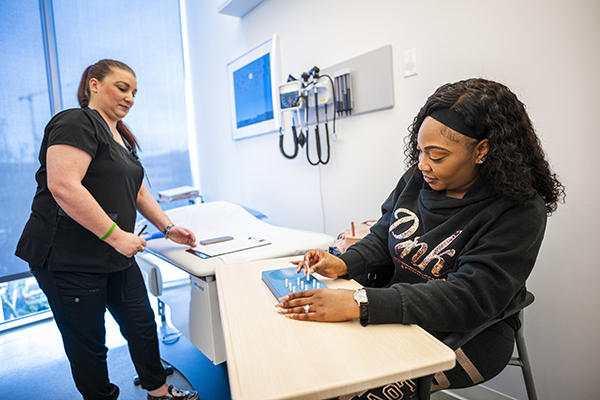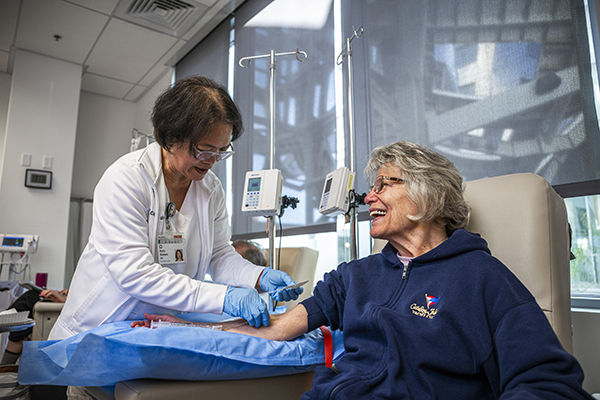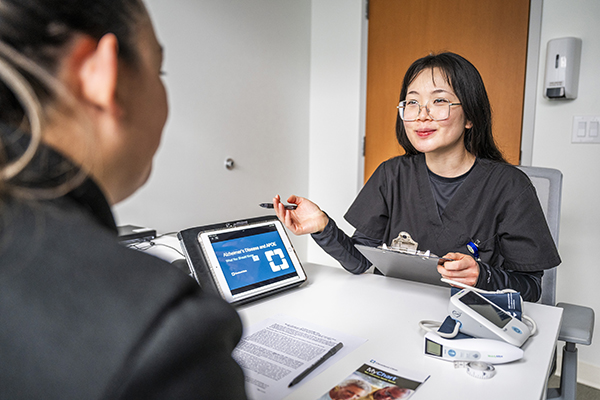Overview
At Cleveland Clinic Lou Ruvo Center for Brain Health, our goal is to help people with degenerative brain conditions thrive as long as possible. You can help us make that happen by taking part in our clinical research in Las Vegas.
If you choose to participate, you’ll collaborate with our researchers. This will help increase our understanding of brain health and changes to watch out for. You’ll be doing it for yourself — and for future generations.
How you can help
When you participate in a clinical research study, you make an important n to advancing brain health. And participation is free. Some studies may even offer a small amount of money or “stipend” as a courtesy for participation.
Our goal is to understand brain health, disease and treatments for everyone. So our researchers need participants from all backgrounds.
Contact our Nevada research team:
702.701.7944
Email the Las Vegas research team.
Clinical trials — a key to new treatments
Clinical trials play a critical role in turning research into real-life solutions. In our trials, volunteers share their medical history and receive potential new treatments. This helps researchers answer medical questions or help measure whether treatments are effective.
Clinical trials are also a required for federal Food and Drug Administration (FDA) approval for new drugs.
Our research in Nevada has led to the FDA approval of eight new drug treatments that are now available for clinical use nationwide . Those eight drugs include five for multiple sclerosis, two for Alzheimer’s disease and one for Parkinson’s disease.
That research success has helped Cleveland Clinic Nevada gain national recognition as a:
- Parkinson’s Foundation Center of Excellence
- CurePSP Center of Care
- National Multiple Sclerosis Society Center for Comprehensive MS Care
Our research also has real-life impact on real people. The drug, lecanemab (Leqembi®), studied at Cleveland Clinic Nevada was approved in 2023 for clinical use in individuals with early-stage Alzheimer’s disease. Today, one man says he now has more time to make memories with his family. Read Dan’s story.

Increasing opportunities for discovery
The Lou Ruvo Center for Brain Health’s clinical research program is among the largest Alzheimer’s disease programs in the country.
Since our program began in 2009, in its first 15 years, our team conducted more than 125 studies of neurological conditions. This includes work in:
- Memory (Alzheimer’s disease and other dementias, memory decline and normal cognition)
- Movement disorders (Parkinson’s disease, Huntington’s disease, progressive supranuclear palsy, or PSP).
- Multiple sclerosis
- Repeated head trauma in active and retired professional athletes
Some of the ways our research team pursues answers to brain disease include:
- Observational research, studies (no treatments) of how the brain changes over time to identify why, when and how normal aging goes wrong.
- Prevention trials, studies of ways to maintain brain health and avoid brain disease.
- Treatment or Clinical trials, tests of promising treatments for people with brain disease.
Participate in Clinical Research
It’s easy to get involved in clinical research at Cleveland Clinic Nevada.
We offer opportunities to participate in research at our Las Vegas campus regardless of where you receive neurological care. Some research studies need volunteers without neurological conditions, too. In order understand how brain health, disease and treatments impact everyone, our researchers need participants from all backgrounds.
How to get started
Are you ready to join a study? Start by contacting the Las Vegas research team so we can find a study that’s right for you.
View open Nevada clinical trials online.
Learn more about Cleveland Clinic’s approach to research.
If you have additional questions, you may call 702.701.7944.

Making a difference — safely
When you take part in clinical research at Cleveland Clinic Nevada, you’re helping scientists learn more about brain disease in people from all backgrounds. It’s one thing you can do that could make a difference for your family and your community. And if you choose to be part of one of our clinical trials, you’ll also receive access to new treatments before they’re widely available
An expert panel of safety advocates called an Institutional Review Board (IRB) reviews each study to ensure your safety and rights are protected.
Prevention

When Cleveland Clinic Nevada opened in 2009, the possibility of preventing brain disease didn’t exist. Today, we’re addressing prevention by investigating potential new treatments to prevent the onset of disease. We’re now also recommending risk-reduction strategies.
Understanding Women’s Increased Risk for Alzheimer’s
Research shows that women are disproportionately impacted by Alzheimer’s disease, making up almost two-thirds of the more than 7 million Americans currently living with the disease.
Our Las Vegas campus is home to the Women’s Alzheimer’s Movement (WAM) Prevention and Research Center — a first-of-its-kind program, which combines clinical care and innovative research to better understand why women are more at risk for this disease and how to prevent it. We look closely at factors specific to women, like menopause. But we also consider conditions like diabetes, which can impact women’s brains more than men’s..
Our main goal is prevention — and that means reducing risk. Published, peer-reviewed research suggests that 45% of Alzheimer’s cases are preventable through lifestyle changes. With this in mind, we’re committed to educating women about tactics against the disease. Those efforts include making changes in nutrition, as well as physical and mental activity.
If you enroll in our clinic, you may also choose to allow our researchers to use information about your brain, which can help us learn more about the differences between men’s and women’s brains.
Innovations
Brain health research programs in Las Vegas
Cleveland Clinic Lou Ruvo Center for Brain Health is dedicated to better understanding of brain diseases and the development of more effective treatments for Alzheimer’s disease, frontotemporal dementia, Lewy body dementia and mild cognitive impairment; Parkinson’s and Huntington’s disease and other movement disorders; and multiple sclerosis.
The center participates in several research studies and clinical trials to advance new treatments and diagnostic approaches for patients, including repurposing drugs approved for other conditions to treat neurodegenerative disorders, leveraging imaging techniques such as MRI, investigating physical activity to slow the advance of disease, and using bioinformatics and clinical data to understand dementia, neuroinflammation, and repetitive head trauma.
Choose a research program
Contact our research team
Phone: 702.701.7944
Email: Email the Las Vegas research team